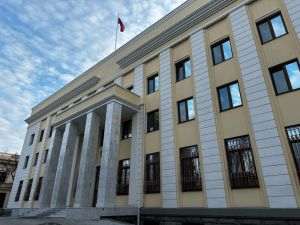All of Europe is concerned over Greece's possible default, save for Romanian politicians. They are more interested in increasing the special salaries and pensions, the issues that Ponta has in the PSD, by Oprea's plagiarism or by the appointment of Mihai Răzvan Ungureanu at the head of the Romanian Foreign Intelligence Service (SIE).
Perhaps it would have been useful for MPs to ask Mihai Răzvan Ungureanu on what his plans are, as head of the Romanian Foreign Intelligence Service, to avoid the contagion in the event that Greece defaults. But because of the boycott of the PSD, the Parliamentary commission for the audit of the SIE could not ask him any questions, so we don't know whether he is considering drafting such a plan.
Even though the leu lost 2% on Monday, being one of the currencies affected by the decision of the Greek government to implement capital controls, our politicians didn't care one bit. If something happens, they will certainly say that they have not been warned about the risks of the situation or will shift the blame to the NBR.
"The government and the Parliament did not even debate once the scenarios to counter the effects of a Greek default, which now looks unavoidable", liberal deputy Andreea Paul told us yesterday. "We currently do not have a prime-minister. What plan of action to counter the effects of the Greek default does anyone expect Romania to have?", she told us.
The MP said that the NBR has conducted analyses and has several scenarios, as the public message of the NBR is meant to encourage. Mrs. Paul said: "The NBR is required to assuage the markets. Taking this under consideration, I can say that the reaction of the National Bank was appropriate. But investment banks and ratings firms are worried over the effects the Greek default might have on Romania, Bulgaria and Hungary".
Andreea Paul also told us that politicians all over the world are keeping an eye on Greece and on the kind of deal it manages to reach with its creditors, because the stake has stopped being economic a long time ago, and has become geostrategic and even military. Several countries have urged Greece to reach a deal with the EU, either by rescheduling its debt, or the interest rates, or by canceling part of the debt.
On Sunday, PSD parliamentary Victor Negrescu, member in the Budget Commission of the European Parliament, has asked for the summoning of the Romanian Supreme Defense Council (CSAT) to assess the effects of the Greek crisis on Romania, as he thinks that Greece's default would affect Romania's economy.
According to the member of the European parliament, Greece is the 6th largest investor in Romania, with investments of almost 13.5 billion Euros, which represents 4.5% of the total foreign capital, and he says that Greece's default would affect the Romanian currency and the banking system. Victor Negrescu even mentioned that there exists a risk of exposure or even default of the four major Greek banks in Romania.
"The Romanian president, who represents Romania on the European Council, has to publicly present the situation to Romanians, the results of the negotiations in Brussels and to summon the Supreme Defense Council to review the effect of the crisis in Greece on Romania", the European parliament said.
But Iohannis stays silent and has so far not brought up the Greek subject, not in the mass-media, nor on the Supreme Defense Council. Instead, he is asking for Ponta's resignation in an interview for Financial Times, thus ignoring the Greek problem. It can be suspected that Victor Ponta, being in Istanbul, has been closer to the Greek problem and he has perhaps devised a strategy to deal with it.
We eagerly await his return.
Greece threatens to sue the EU
• Yanis Varoufakis: "EU treaties do not stipulate the exit from the Eurozone and we refuse to accept it"
Greece has threatened to sue the European Union (UE) to block the exclusion of the country from the European Union and to avoid the collapse of the banking system, according to Daily Telegraph. A lawsuit on the European Court of Justice against the institutions of the EU would be an unprecedented decision and would complicate Greece's situation.
"The Greek government will use every legal right", said Greek finance minister Yanis Varoufakis, and he stressed: "We are getting counsel and we will certainly take under consideration a lawsuit with the European Court of Justice.
The EU treaties do not stipulate an exit from the Eurozone and we refuse to accept it. Our membership is not negotiable".
The statement was made after the European leaders warned Greece that it would be forced to exit the monetary union if, in Sunday's referendum, Greek voters vote against the austerity measures proposed by the international creditors.
German vice-chancellor Sigmar Gabriel thinks that the Greek people should not delude itself about the choice it is expected to make. "It needs to be very clear what is at stake. Essentially, we are talking about a yes or no on staying in the Eurozone or not".
Greek officials are considering suing the European Central Bank as well, for deciding to freeze the financing of the Greek banks, even though the country's duty is to ensure financial stability.
On Sunday, Greek prime-minister Alexis Tsipras has decided to summon a referendum on July 5th on the austerity measures decided by Greece's creditors.
The announcement took by surprise the ministers of finance in the Eurozone (Eurogroup), who rejected the request of the authorities in Athens to extend by a month the financial aid of 240 billion Euros, of which Greece still needs to receive 7.2 billion Euros.
Greece was supposed to repay yesterday a debt of 1.6 billion Euros to the IMF and also set to expire yesterday was the international financing program. Greek finance minister Yanis Varoufakis, confirmed that Greece would not pay the installment to the IMF, which officially puts the country in default.
Yesterday, Greece sent its creditors a proposal on a new two-year financing agreement, agreed with the European Stability Mechanism (ESM) and also called for the restructuring of its debt.
"Greece is staying at the negotiations table and is trying to find a viable solution that would allow it to stay in the Eurozone", according to the press release of the Greek government.
Under these circumstances, the president of the Eurogroup, Jeroen Dijsselbloem, has asked for the organizing of a teleconference of the ministers of finance in the Eurozone, starting with 17:00 GMT (20:00 Romanian time), for discussing the proposals formulated by the authorities in Athens.
By the time the newspaper had gone to print, no result of the discussions had been made public.
Greece's total debt is 320 billion Euros, of which 65% to countries in the Eurozone and to the IMF, and 8.7% to the European Central Bank (BCE).
Fitch has downgraded Greek banks
Fitch Ratings has downgraded the credit ratings of the main Greek banks - "Piraeus Bank" SA, "Eurobank Ergasias" SA, "National Bank of Greece" SA and "Alpha Bank" AE -, after the Greek central bank advised closing the banks and enacting capital restrictions.
Fitch has revised downward the banks' long and short term ratings from "CCC", and "C" respectively, to "RD" (restricted default). Viability rating have been cut from "ccc" to "f", with a "stable" outlook.
Fitch specialists consider that Greek banks would have gone bankrupt and gone into default had capital controls not been implemented, given the massive withdrawals and the decision of the ECB not to increase the emergency financing intended for Greek lenders.
Also, Standard & Poor's downgraded Greece one step on Monday, to "CCC-", stating that Greek prime-minister Alexis Tsipras is endangering the country's financial stability, by summoning the referendum.
The financial ratings firm thinks that there is a 50% chance of Greece exiting the Eurozone and that the country's default is unavoidable in the next six months, if circumstances don't change. (A.V.)
•
• Banks have been reopened for pensioners
Today, Greece is reopening a thousand bank branches, to repay the pensions of those who do not use cards, the Ministry of Finance in Athens announced.
The branches will be opened until the end of the week, and pensioners will be allowed to withdraw up to 120 Euros.
The Ministry of Finance issued assurances that bank deposits are safe.
For other operations, Greek banks will be closed for the entire duration of this week, until the referendum.
•
• Germany, Greece's biggest lender
Greece owes its official creditors the amount of 242.8 billion Euros, and Germany is by far its biggest lender, according to Reuters calculations, Agerpres writes. The figure includes the loans granted as part of the two aid programs with the European government and the IMF, with a nominal value of 220 billion Euros up until now, which have been partly repaid, as well as the Greek government bonds owned by the ECB and other national banks in the Eurozone.
Private investors hold private government bonds worth 38.7 billion Euros. Also, the Greek government has issued short term government bonds worth 15 billion Euros, mostly held by private banks.
The ECB holds approximately 18 billion worth of Greek bonds.
•
The Tradeweb trading platform yesterday halted trading in some Greek bonds, following a notification from the British Supervision Authority (FCA), whereas the Luxemburg exchange halted operations in 28 types of Greek bonds.
The Luxemburg Exchange suspended trading in the bonds of "National Bank of Greece", "Alpha Bank", "Eurobank", "Piraeus Bank", "Eurobank", "Hellenic Railways Organisation" and of the Greek government, according to Financial Times.
•
The Greek Financial Stability Fund (HFSF) was created in July 2010, as an entity with administrative and financial autonomy, which had as its goal to preserve the stability of the Greek banking system.
The Fund became operational on September 30, 2010, after it received 50 billion Euros from the bailout package received from the IMF and the EU to recapitalize the Greek banks. The HFSF has recapitalized the Greek creditors with bonds of the European Financial Stability Facility (EFSF), which banks can use as collateral for direct financing from the European Central Bank (ECB).
In Spring 2013, the HFSF and the Bank of Greece have led the process for the merger of ten banks in the country, which generated four "systemic" lenders: National Bank of Greece, Alpha Bank, Eurobank-Ergasias, Pireaus Bank. The HSFS bought all the shares and convertible bonds issued by the banks, becoming the biggest shareholder in Greek lenders.
The HFSF received 48.2 billion Euros between 2012 and 2014 for the recapitalization of Greek banks. The banks have used over 37.3 billion of that money, while the remaining 10.9 billion remained unused. Thus, in the beginning of 2015, the HFSF still had a buffer capital of 11 billion Euros in EFSF bonds, which the Greek government in office at the time intended to transform into a stand-by line of credit. But once the government in Greece was replaced in January this year, the amount of 10.9 billion Euros returned to the bailout fund of the Eurozone, and can be used if banks need recapitalization, subject to approval from the ministers of finance of the Eurozone.
The HFSF also has liquidity reserves of approximately 856 million Euros - commissions and revenues.
Also this year, the European Stability Mechanism (ESM) approved the transfer of 555 million Euros from the HFSF to Greece.
In 2014, the fund had interest revenues of 76.7 million Euros, compared to 167.6 million in 2013. Depreciation and provisions losses amounted to 284 million Euros.












































